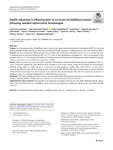2020-08-26Zeitschriftenartikel
Health outcomes in offspring born to survivors of childhood cancers following assisted reproductive technologies
Sommerhäuser, Greta
Borgmann-Staudt, Anja
Astrahantseff, Kathy
Baust, Katja
Calaminus, Gabriele
Dittrich, Ralf
Fernández-González, Marta J.
Hölling, Heike
König, Charlotte J.
Schilling, Ralph
Schuster, Theresa
Lotz, Laura
Balcerek, Magdalena
Purpose
An increasing number of childhood cancer survivors are using assisted reproductive technologies (ART) to overcome treatment-related fertility impairment. We report perinatal and health outcomes of offspring born to survivors following ART.
Methods
The FeCt Multicenter Offspring Study surveyed the health of offspring of childhood cancer survivors. Health outcomes in offspring born to survivors following ART (n = 57, 4.6%) or after spontaneous conception (n = 1182) were assessed in the German cohort (n = 1239) using bivariate analysis. Findings were put into the context of the general German population by health outcome assessment in 1:1 matched-pair analysis (n = 2478).
Results
Nearly twice the survivors used ART compared with numbers reported for the German general population (4.6% vs. 2.6%). Successful pregnancies were achieved after a median of two cycles, mainly using non-cryopreserved oocytes/sperm. Multiple sibling births (p < 0.001, 28.1% vs. 3.0%) and low birth weight (p = 0.008; OR = 2.659, 95% CI = 1.258–5.621) occurred significantly more often in offspring born to survivors who utilized ART than spontaneously conceived children, whereas similar percentages were born preterm or too small for their gestational age. ART did not increase the prevalence of childhood cancer or congenital malformations in offspring born to survivors.
Conclusion
ART use by childhood cancer survivors was successful with both fresh and cryopreserved oocytes/sperm, and did not influence perinatal health or health outcomes when known confounders were taken into account.
Implications for Cancer Survivors
Oncofertility is an important component of patient care. Our study implicates that the utilization of ART by adult survivors of childhood cancer does not put offspring at additional risk for adverse perinatal or health outcomes.
Dateien zu dieser Publikation

